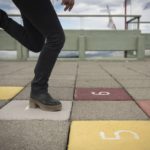I have a serious addiction. It’s private, hidden, and covert. My secret addiction is that I need a daily dose of heroes.
I get my fix from television. Since childhood, starting with the Lone Ranger, I’m comforted by watching television heroes rescue the innocent targets of tyrants. The premise of these shows is simple: someone in trouble needs help, and the hero helps them.
I look for reruns of shows I watched when I was young, like The Lone Ranger and the A-Team. In these shows, the heroes spent more time saving the damsel in distress and less time making  a mess shooting up the bad guys. Today my drug of choice is the remake of the series S.W.A.T. If I’m ever in deep trouble, I know these guys will come to my rescue because:
a mess shooting up the bad guys. Today my drug of choice is the remake of the series S.W.A.T. If I’m ever in deep trouble, I know these guys will come to my rescue because:
- My heroes protect me from real and imagined dangers.
- My heroes right wrongs for the sake of justice, not to obtain monetary rewards or glory.
- My heroes are trustworthy.
- They rescue women without demeaning them.
- My heroes are courageous, sober, incorruptible, and honest.
I Need to Feel Safe & Protected
Many women don’t feel safe at a bone-deep level. Two personal examples illustrate the taken-for-granted nature of feeling unsafe. You probably have your own examples as well.
When I lived in NYC, I had my familiar streets I traveled to get home from different parts of the city. However, if it were dark, I’d take a long look down that city block. If no one else were out, I would take the busier, noisier street, even if it was longer and more indirect, but safer.
Whenever I’ve lived alone, I wouldn’t sleep with the windows open. I’ve lived in neighborhoods where people cover their windows with security bars (attractive looking bars but bars all the same). And I’ve lived in neighborhoods where this extra security was not necessary. Now with my 70-lb lab/boxer roommate, I worry less. Instead of security bars, I have sliding window locks so I can keep the window open a few inches with the lock keeping the window in place. Even with the dog.
It takes a lot of energy and time to figure out how to walk home without having to be on guard, or go to sleep and enjoy fresh air circulating through the apartment or house and not stay alert to unusual sounds…although truthfully being on guard seems to be how women get along. It’s hyper-vigilance for safety’s sake, and it’s part of women’s everyday experiences. More cautious, more on guard, in everyday situations compared to men.
The Whys and Wherefores
Although my hero habit has existed for years below my conscious awareness, this is the week it surfaced. So I wanted to grab hold of it before it eluded me once more. This time, I needed to talk to with it, to learn why it possesses me and won’t let me go. I’m writing about it now, so I don’t misplace what I learned. I identified three, and possibly four reasons for my hero habit. They are:
- Biology
- Culture
- Family
- Archetypes
Biology
Women are vulnerable because in general, we are smaller than men and lack the physical strength of men of the same height and weight. At the same time, American culture reinforces these biological disadvantages by disparaging women who are strong and muscular: muscularity is associated with masculinity; muscular women don’t conform to acceptable femininity; strong, muscular women are suspected of taking steroids; and judged to be unattractive. If being the weaker sex makes women more attractive, it also puts us at greater risk.
Culture
For generations, cultural norms—in tandem with laws—kept women out of higher-paying jobs and channeled them into lower-paying sex-segregated occupations like secretarial work and nursing. Laws that gave women some of the same financial and economic rights as men were established over the past 100 years. Women could not be self-sufficient and independent when we didn’t have rights to own property (granted in the 1900’s), open a bank account in their own names (the 1960’s), or have their own credit cards (1970’s), In fact, women were dependent on husbands and fathers. Relying on the goodwill of men for having needs met put women on an unequal playing field that required us to be pleasant and nice, not upsetting anyone, and suppressing any strong opinions in order to get what we needed.
Additionally, our parents and grandparents read us fairy tales—many of these stories reinforced the hero fantasy. The story is repeated over and over: an innocent young girl is trapped and helpless and waits for the charming prince to rescue and set her free. I could become Sleeping Beauty, Rapunzel, or Snow White and dream about being liberated from my prison by a tall, dark, handsome prince who was also trustworthy, selfless, and courageous.
Family
There’s another piece of the puzzle of this deep desire for protection. My parents were distracted by their own lives and problems and had little interest in the children. At an early age, I had to take care of myself as well as my younger siblings, having adult responsibilities hoisted on me too early. In addition to feeling vulnerable as a girl and worried about my safety and long-term survival if my prince didn’t show up, I felt neglected and invisible at home. Having adult responsibilities at a young age and none of the adult skills that should go with those responsibilities increased my fears, worries, and general anxiety about my ability to cope. All this on top of my fears about dragons, giants, dungeons, wicked witches, exploitative fathers, and evil kings.
Archetypes
The psychologist, Carl Jung, used the concept of archetype in his theory of the human psyche. He believed that universal, mythic characters—archetypes—reside within the collective unconscious of people the world over. One of the most discussed and prominent archetype is the hero. The hero is a leading character in the U.S. Heroes are the leading figures in our movies, television shows, novels, and popular culture with its cult of celebrity. And, when we are taught about historical events and revolutions, we’re told the stories of individual men at the center of the drama, showering them with praise and admiration for their determination, military intelligence, and bravery while ignoring their moral shortcomings.
I wasn’t taught to be my own hero, but that someday my hero would show up. Then everything will be all right.
It’s Both Personal & Political
When I was a child, I may have been innocent and helpless, but today I am capable and strong.
- I’m fully self-supporting.
- I have wise friends and I consult with them when I need help.
- I know who I am and I like her.
- I show up for other people in compassionate and trustworthy ways.
- I keep toxic people and toxic situations out of my life.
But I can still find myself at the mercy of a villain, whether it’s a person, an institution, or a political system. I can feel defenseless and helpless at times, overwhelmed and wanting to rely on someone bigger and stronger.
I need to examine my hero habit. To kick a habit, you first need to know you have it. The next step is to look directly at it, not away, and name it. Otherwise, your unconscious habits and addictions will operate behind the scenes as we make decisions. They shape our choices in work, marriage and family, religion, and politics. How does my hero habit determine who I marry? How I vote? What kind of work I do? The risks I’m willing to take?
If I get free of this addiction, what is possible? If I felt safe, empowered, and free to act without worryies about my physical, emotional, or psychological safety at the forefront of my mind, what would be possible? Would I be a new breed of woman, without this fear in my bones.
We do not have to become heroes overnight. Just a step at a time, meeting each thing that comes up … discovering we have the strength to stare it down. Eleanor Roosevelt
Is the hero habit my personal addiction, or does it affect you as well? If you identify with any part of this post, I would love to know it. I would also like to hear where you disagree with me. You can always email me or post on the Comments section below to share your thoughts, questions, and comments.








